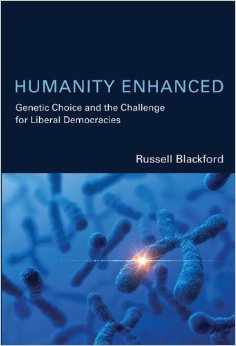Humanity Enhanced appears from MIT Press
 My newest book – from MIT Press in this case – is Humanity Enhanced: Genetic Choice and the Challenge for Liberal Democracies. This is based on my PhD dissertation from Monash University, completed back in 2008, but the text has since been reworked quite heavily – expanded in some respects, simplified in others, updated, rejigged to deal with some issues raised by anonymous reviewers for MIT Press, and generally altered sufficiently to be a quite separate work.
My newest book – from MIT Press in this case – is Humanity Enhanced: Genetic Choice and the Challenge for Liberal Democracies. This is based on my PhD dissertation from Monash University, completed back in 2008, but the text has since been reworked quite heavily – expanded in some respects, simplified in others, updated, rejigged to deal with some issues raised by anonymous reviewers for MIT Press, and generally altered sufficiently to be a quite separate work.
It includes a lengthy (and I hope useful) discussion of the therapy/enhancement distinction that does not appear in the dissertation, although I did write something along these lines at the time before deciding that it was not appropriate in that context.
While MIT Press is announcing Humanity Enhanced with an official 2014 publication date, and it bears a 2014 copyright date inside the book, it has actually been available for purchase for three or four weeks now, at least from Amazon.
Humanity Enhanced stands alone. However, it is best to read it in conjunction with my 2012 book Freedom of Religion and the Secular State, as both deal with aspects of legal/political philosophy and liberal theory. Between them, they give a rather comprehensive picture of my position in legal and political philosophy, which is not to say that they tell you how I would vote on every policy issue that comes up.
Indeed, my philosophical position gives a quite wide discretion to voters, electorates, political parties, and legislatures to disagree reasonably on such issues as exactly what laws should be enacted, what economic policies to pursue, what punishments to impose for various crimes, etc. I don’t claim that we can simply read off “correct” answers to such issues from our philosophical positions, although I do claim that we should agree to rule out some arguments as good justifications for our laws and policies. If my arguments for that are accepted, many substantive policy positions become very difficult to justify while others become very difficult to oppose reasonably.
In Humanity Enhanced I focus on technologies of genetic choice, such as preimplantation genetic diagnosis to select embryos, human reproductive cloning to bring into the world a child with a particular genome, or genetic engineering in the sense of altering an embryo’s DNA (and hence its genetic potential). I argue that public policy in this area has shown a considerable degree of illiberalism and even moral panic. We can, I suggest, do better than this. Next time we are confronted with some apparently scary innovation we can ask whether its prohibition is really justifiable in accordance with secular and liberal principles such as we’ve inherited from the Enlightenment.


